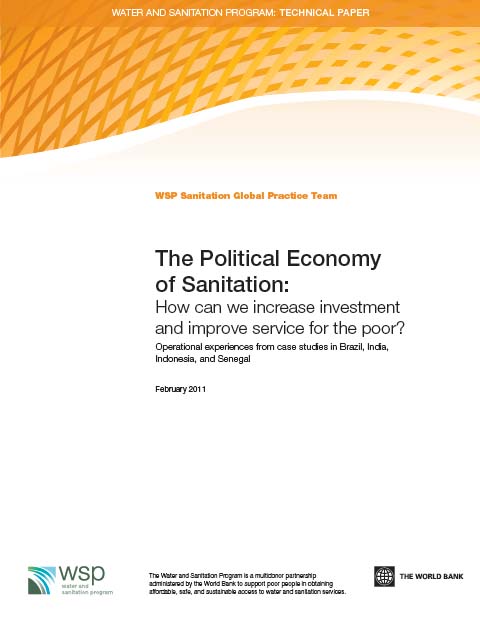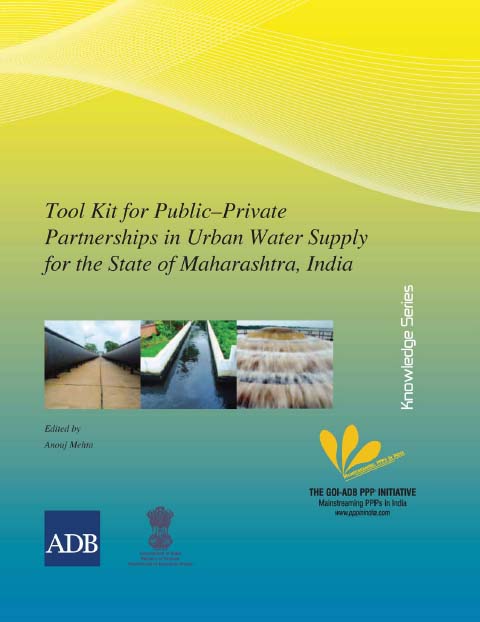/topics/sanitation-and-hygiene
Sanitation and Hygiene
Water.org invites applications for South Asia Regional Director based at India
Posted on 28 Jul, 2011 05:43 PMWater.org, a non-governmental organization working to solve the global water and sanitation (WSH) crisis, seeks an experienced, innovative Regional Director to lead its professional South Asia team in India.
The political economy of sanitation - How can we increase investment and improve service for the poor? – A report by Water and Sanitation Program
Posted on 26 Jul, 2011 02:53 PM This global study attempts systematically to understand and thus help practitioners manage the political economy of pro-poor sanitation investments and service provision.
This global study attempts systematically to understand and thus help practitioners manage the political economy of pro-poor sanitation investments and service provision.
It aims to provide practical advice to multi-lateral agencies and sanitation practitioners to help them better manage stakeholder relations and effectively maneuver within the complex institutional relationships of the sanitation sector in order to enhance the design, implementation, and effectiveness of operations that provide pro-poor sanitation investments and services. The ultimate goal is to improve health and hygiene outcomes.
This study follows current approaches to political economy - interdisciplinary inquiry drawing upon social and political theory and economic principles - to understand how political actors, institutions, and economic processes influence each other. This study’s conceptual framework combines a diagnostic component with a typology of actions to help translate analytical findings into more effective support to operations and investments.
Guidelines of the Central Rural Sanitation Programme and Total Sanitation Campaign by the Department of Drinking Water and Sanitation (2011)
Posted on 25 Jul, 2011 07:30 PMThis document by the Department of Drinking Water and Sanitation deals with the guidelines of the Central Rural Sanitation Programme (CRSP) and Total Sanitation Campaign (TSC). India’s first nationwide programme of rural sanitation, the CRSP was launched in 1986, while TSC was launched in 1999 with the aim of ending open defecation.
Public-Private Partnerships in urban water supply for Maharashtra – Tool kit by GoI-ADB PPP Initiative
Posted on 16 Jul, 2011 06:48 PM
The various possible PPP structures for the sector were studied, and their applicability assessed in the context of the selected sample cities. Consultations led to development of term sheets for these PPP structures, which were identified as most suitable and feasible for implementation.
The above exercise has led to development of this report, which may be considered as a tool kit designed to help decision makers decide whether a particular project might be suitable for the PPP route or not. The tool kit can, therefore, be the basis for approving a project implementation structure as part of the overall project approval methodology.
DFID India is looking for water, sanitation and hygiene adviser at New Delhi – Apply by July 15, 2011
Posted on 07 Jul, 2011 08:38 PMContent courtesy: DevNetJobsIndia and Transearch India
Department For International Development (DFID) India works in partnership with government, international organisations, civil society and private sector. The 90 staff based in our New Delhi office (co-location with the British High Commission is planned for 2012) work with the Government of India on nationwide programmes, and with governments in a number of states with particular poverty needs. The State Offices provide support and local knowledge.
Grampari is looking for various jobs at Panchgani, Maharashtra
Posted on 04 Jul, 2011 01:13 PM Grameen Pariyavaren Kendra (Grampari) is a programme of initiatives of change which, for the last 40 years, has held trainings on values based leadership development in Panchgani, Maharashtra and has enabled people to become powerful agents of change via personal transformation.
Grameen Pariyavaren Kendra (Grampari) is a programme of initiatives of change which, for the last 40 years, has held trainings on values based leadership development in Panchgani, Maharashtra and has enabled people to become powerful agents of change via personal transformation.
We are looking for motivated Marathi speaking people to join our team for the following positions:
Establishment and management of community sanitary complexes in rural areas - A handbook by Water and Sanitation Program
Posted on 28 Jun, 2011 10:45 PM It is intended primarily for programme implementers to help them understand the critical need for Community Sanitary Complexes and inform them of the guiding principles to be adopted while planning for these.
It is intended primarily for programme implementers to help them understand the critical need for Community Sanitary Complexes and inform them of the guiding principles to be adopted while planning for these.
India remains one of the countries wherein concerted efforts are still required to eliminate the practice of open defecation. The lack of priority given to safe confinement and disposal of human excreta poses significant health risks manifest in the sanitation challenge facing the nation today.
The provision of sanitation facilities through public toilet complexes is the most suitable option for those who cannot afford individual toilets for monetary reasons or due to lack of space, and opt for open defecation. Such complexes are a useful and valuable option at public places, markets, taxi stands, etc., where a large congregation of people takes place. The Community Sanitary Complex (CSC) fosters the cognitive development of healthy sanitation practices in the community.
Call for EOI for sub grantees to support 'Promoting sustainable sanitation in rural India' - Apply by July 5, 2011
Posted on 28 Jun, 2011 06:37 PMThe Global Sanitation Fund (GSF) has selected India as part of the country programmes portfolio to implement a US$ 5 million fund aimed towards promoting sustainable sanitation in rural India, with special focus in the states of Assam and Jharkhand. The programme seeks to respond to fundamental challenges in the Indian Rural Sanitation Sector. In this respect it is consistent with the core principles espoused by the Government of India (GoI), the GSF and the institutional and funding arrangements prevalent in the sector and, aims at influencing long-term, sustainable change.
Public toilets In disrepair, villagers suffer - Video Volunteers : Article in India Unheard
Posted on 28 Jun, 2011 05:38 PM
In Kokkarapati village (TN), dilapidated public toilets cause difficulty, disease and humiliation.
Centrally sponsored schemes ARWSP and TSC have not done enough to ensure right to water and basic sanitation : Article from Combat Law
Posted on 28 Jun, 2011 04:59 PMThe Universal Declaration of Human Rights (1948) recognises the inherent dignity and the equal and inalienable rights of all human beings. There are certain basic needs that are essential for a dignified life. Water and sanitation are two of these essential human needs and a clean environment is also increasingly recognised as a fundamental human right.





